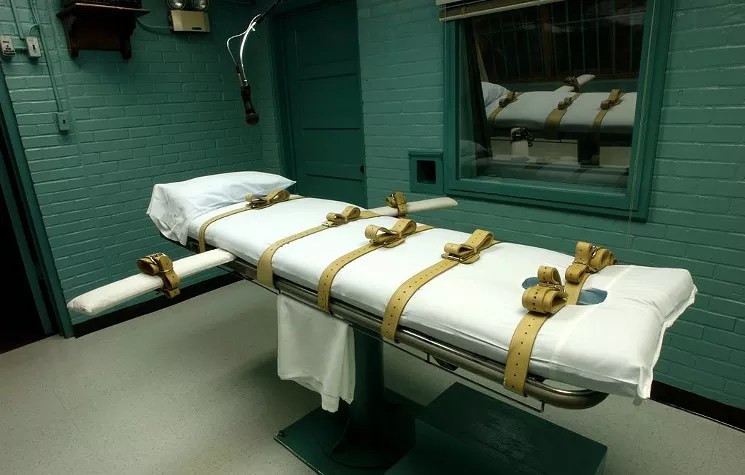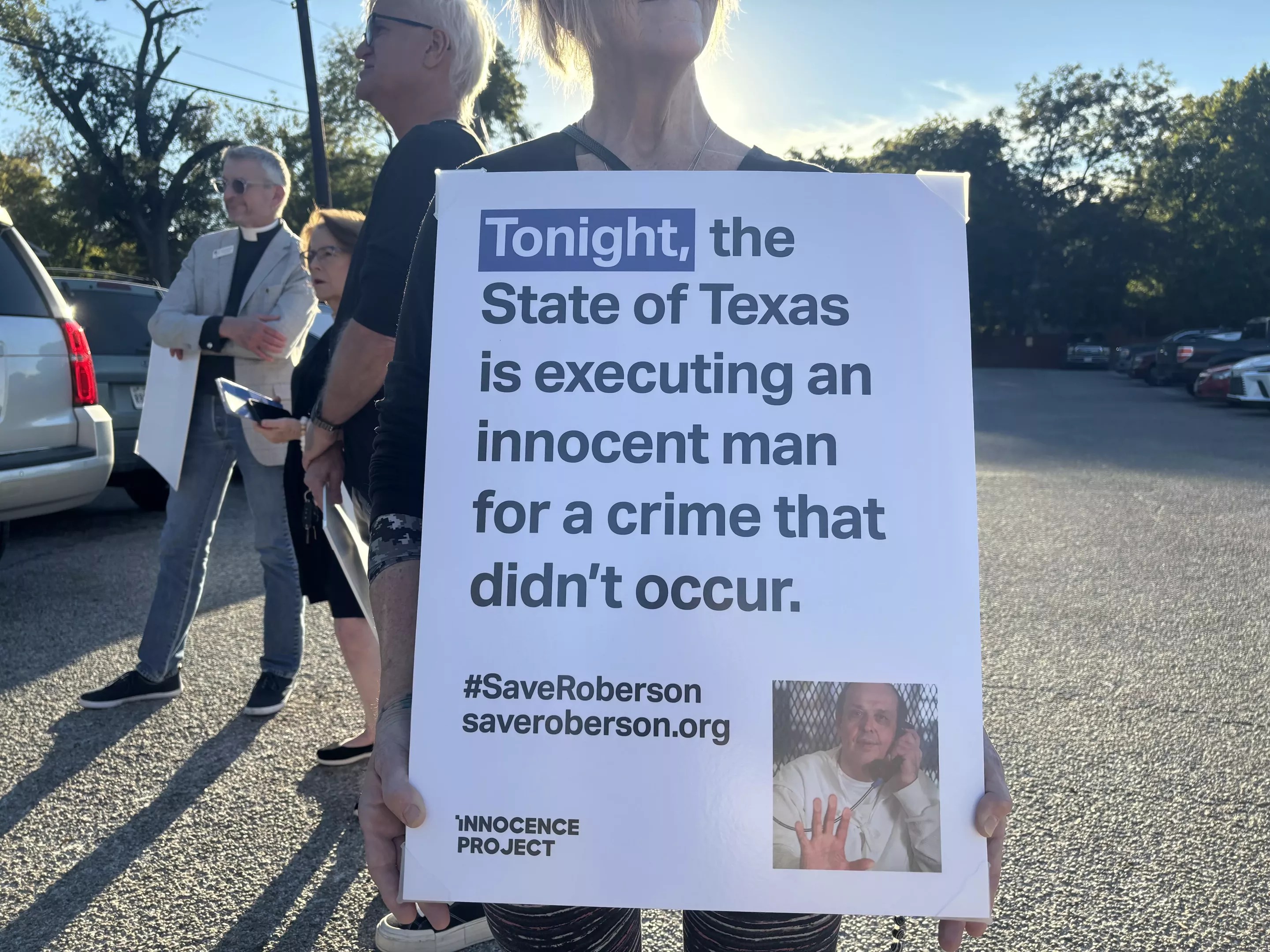
Texas Department of Corrections

Audio By Carbonatix
Nearly one year to the day after staving off a state-sanctioned death, Robert Roberson is scheduled to die by lethal injection at the Texas State Penitentiary on Oct. 16.
Roberson, who hails from Palestine in East Texas, was found guilty in the death of his 2-year-old daughter, Nikki, in 2003, but experts now say the science used to prove Roberson’s culpability has since been debunked. Roberson’s 2024 execution was stayed at the last minute after a rabble-rousing group of House legislators positioned themselves against the state, which carries out execution orders.
There is an appeal before the Texas Court of Criminal Appeals that asks for Roberson to be retried. His attorneys say information about his daughter’s severe illness at the time of her death was withheld from the jury during his first trial.
In the meantime, novelist John Grisham is chronicling Roberson’s story as part of a “last-ditch effort to raise awareness” for the case and once again delay the execution. If killed, Roberson would be the first person ever convicted of a shaken baby syndrome case to be killed.
Here is everything you need to know about the Robert Roberson case.
January 2002
Roberson takes his daughter, Nikki, to an emergency room in Palestine, saying that he found the girl unresponsive after she fell from her bed. In the days prior, Nikki had been diagnosed with a respiratory illness, had recorded a fever of 104.5 degrees and was given prescriptions for promethazine to treat the illness. Doctors later pronounced the toddler dead.
A doctor diagnoses Nikki with Shaken Baby Syndrome, a form of child abuse, and Roberson is charged with the death of his daughter and arrested.
February 2003
During Roberson’s trial, medical providers testiy that they found Roberson’s response to his daughter’s illness suspicious, because he did not present the amount of distress they’d expect from a father whose daughter has just died. The experts also say they believe that Nikki died of head trauma that resulted from Roberson shaking her violently, and that an autopsy revealed brain bleeds and bruising.
One expert also testifies that they believe Roberson had sexually assaulted Nikki, but the claim is dropped after no evidence is found to support the claim.
Roberson’s lawyers, rather than argue that Nikki’s condition could have resulted from lifesaving measures taken or her prior illness, say the man did not intend to kill his daughter. At the trial’s end, Roberson is found guilty of capital murder and sentenced to death by an Anderson County court.
July 2007
The Texas Court of Criminal Appeals dismisses an appeal filed by Roberson’s attorneys, the first of several requests to reexamine the case that will be struck down. In the summer of 2015, the U.S. 5th Circuit Court of Appeals strikes down additional appeals requests.
2013
Texas becomes the first state in the United States to pass a law that allows criminal cases to be reexamined if they were argued using science that has since been disproven, known as the “junk science law.”
Around the same time, questions regarding the legitimacy of the “Shaken Baby Syndrome” theory as a medical diagnosis begin to gain traction, with some researchers arguing that shaking a child with the rigor that would result in death would also result in other symptoms often unseen in SBS cases. In subsequent filings, Roberson’s legal team argues that Nikki’s diagnosed pneumonia, which developed into sepsis, should have been considered as a contributor to her death.
June 2016
Lawyers argue that the scientific community’s evolving understanding of Shaken Baby Syndrome allowed the case to be granted a second look under Texas’ junk science law, and that testimony presented during the initial trial violated Roberson’s constitutional right to a fair proceeding.
Roberson’s first execution is stayed four days before he is scheduled to be killed, and the Texas Court of Criminal Appeals sends his case back to his Anderson County trial court to be reevaluated.
2018
Roberson is diagnosed with Autism, which some experts say could have contributed to his behavior on the day of Nikki’s death.
2021
During the evidentiary trial, the defense presents updated scientific analysis that they believe brings the conclusion that Roberson killed Nikki by shaking her into question.

A protestor holds a sign in Huntsville on Oct. 17, the day Robert Roberson was scheduled to be executed.
Jordan Maddox
2023
In January, the court finds that there is not enough evidence to warrant Roberson’s case being overturned.
Roberson’s attorneys file an appeal to the United States Supreme Court outlining the case in May. The filing argues that the evidentiary trial’s refusal to thoroughly reexamine Roberson’s case proves that Texas’ junk science law is “meaningless.”
The Supreme Court rejects the appeal in October.
May 2024
Brian Wharton, the detective who investigated and testified against Roberson, tells The Dallas Morning News that he has regretted his involvement in the case “for 20 years,” and urges the State of Texas to take Roberson off death row.
“It would be a terrible legacy for all of us to be associated with executing an innocent man based on a rush to judgment and bad science,” said Wharton. ​”We must prevent Texas from making a tragic, irreversible mistake.”
July 2024
An Anderson County court convenes in July and determines that Roberson will be killed in October, his second execution date. Although his lawyers file additional appeals, arguing that Roberson’s autism diagnosis prevented him from being fairly tried, the requests are denied over the subsequent months.
October 2024
In the days leading up to Roberson’s execution, scheduled for Oct. 17, several appeals and pleas for clemency are ignored or denied, and outrage surrounding the case grows. On Oct. 15, two days before he is set to be killed, the Texas Committee on Criminal Jurisprudence approves a subpoena that calls for Roberson to testify before the committee.
The Texas parole board votes against commuting Roberson’s sentence, eliminating the final path for Gov. Greg Abbott to grant a pardon in the case. Abbott remains largely silent on the case even as attention grows.
Oct. 17, 2024
Roberson is scheduled to be killed by lethal injection at 6:00 p.m.
In the hours leading up to 6:00 p.m., members of the Texas Committee on Criminal Jurisprudence begin filing appeals in the case, arguing that the state carrying out the execution would override their right to subpoena Roberson, who is scheduled to testify on Oct. 21.
At 10:00 p.m., the Texas Supreme Court issues a stay on the execution, arguing that the conflicting interests of the judicial and legislative branches have introduced a constitutional crisis. Attorneys say Roberson is “shocked” to learn his execution has once again been delayed.
November 2024
Attorney General Ken Paxton bars Roberson from testifying in person before the Texas Committee on Criminal Jurisprudence.
The Texas Supreme Court rules that state lawmakers violated their constitutional duties by interfering with the scheduled execution of Roberson. Still, the body acknowledges the committee’s right to have Roberson testify, as he is alive.
July 2025
A judge schedules a third execution date for Roberson. He is scheduled to be killed at the Texas State Penitentiary on Oct. 16 at 6 p.m.